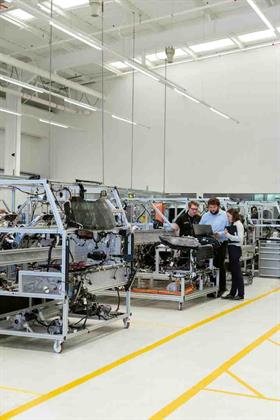
Odoo API Integration Services Enhancing Pharmaceutical Manufacturing Operations
May 07, 2025
What is Odoo API Integration? A Quick Overview for Pharma Businesses
In today's digital-first pharmaceutical sector, operational efficiency and real-time system connectivity are critical to ensuring compliance, quality, and speed. Pharmaceutical firms can use Odoo API connection to connect many apps, including inventory, production, LIMS, and CRM, to their core Odoo ERP system. This integration guarantees that data flows effortlessly between platforms, which improves decision-making and eliminates unnecessary manual processes.
Odoo api connection services offer pharmaceutical businesses a valuable tool for unifying disparate systems into a single cohesive framework. Whether it's synchronising production plans with regulatory databases or automating inventory monitoring via warehouse management systems, the connectivity provides organisations with real-time information and process automation. This eventually enables faster time-to-market, improved resource management, and increased scalability—all of which are critical in a highly regulated and competitive market.
Benefits of Odoo API Integration in Pharmaceutical Operations
Real-Time Data Synchronization: Odoo API integration ensures seamless real-time synchronization of data across systems, enabling pharmaceutical companies to maintain accurate inventory, production, and sales records. It eliminates data silos, ensures up-to-date information across departments, and supports faster decision-making through timely access to critical operational and patient-related information.
Enhanced Traceability: With Odoo APIs, pharmaceutical businesses can trace each product’s journey—from raw material procurement to distribution—with precision. This end-to-end visibility supports quality control, simplifies batch tracking, enables swift recalls when needed, and boosts consumer trust by ensuring transparency throughout the supply and production chains.
Regulatory Compliance Automation: Odoo API integration automates compliance workflows, such as audit trails, electronic batch records, and GMP documentation. This reduces manual effort and human oversight while helping pharmaceutical firms adhere to strict regulatory standards like FDA, EMA, or WHO. It ensures timely reporting and lowers the risk of compliance penalties.
Improved Operational Efficiency: Odoo APIs streamline operations by connecting various pharmaceutical functions—like procurement, production, inventory, and finance—on a unified platform. Automated workflows minimize redundant tasks, improve collaboration, and optimize resource use. The result is faster turnaround times, reduced costs, and a smoother end-to-end operational process.
Scalable Infrastructure: API-based integration allows pharmaceutical companies to easily scale their systems as operations grow. Whether expanding to new markets or adding new business units, Odoo supports modular integration with external tools and platforms. This scalable architecture reduces the need for complete system overhauls and ensures long-term adaptability.
Reduced Human Error: Automation through Odoo APIs reduces reliance on manual data entry, minimizing the chances of errors in production records, prescriptions, labeling, and inventory tracking. This not only safeguards product quality and compliance but also protects patient safety and improves overall organizational accuracy and reliability.
Connecting Core Systems: How Odoo Integrates with LIMS, ERP, SCM, and More
LIMS (Laboratory Information Management System): Odoo integrates with LIMS to centralize lab operations, enabling seamless data flow between research, testing, and ERP functions. This boosts accuracy in lab results, automates reporting, and ensures compliance with industry regulations, making it ideal for pharmaceutical, biotech, and chemical manufacturing environments.
ERP (Enterprise Resource Planning): By serving as the core system or integrating with existing ERP platforms, Odoo provides a unified platform for finance, HR, operations, and inventory. This integration eliminates silos, enhances real-time visibility, and supports agile decision-making, helping businesses scale efficiently and remain competitive.
SCM (Supply Chain Management): Odoo connects with SCM systems to synchronize procurement, production, logistics, and distribution workflows. This integration ensures end-to-end supply chain transparency, reduces delays and errors, and allows proactive management of supplier relationships and inventory levels for optimized operational performance.
MES (Manufacturing Execution System): Integrating Odoo with MES bridges the gap between production floor activities and business planning. It enables real-time monitoring of production metrics, resource allocation, and quality tracking, improving manufacturing agility, reducing downtime, and enhancing throughput across discrete or process manufacturing environments.
WMS (Warehouse Management System): Odoo’s WMS integration streamlines inventory handling, picking, packing, and shipping processes. Real-time data syncing enables accurate stock levels, reduced handling times, and improved order accuracy. This improves warehouse efficiency and supports just-in-time fulfillment strategies critical for modern supply chains.
CRM (Customer Relationship Management): Integrating CRM with Odoo helps unify sales, marketing, and support functions. It provides a 360-degree view of customer interactions, automates lead nurturing, and enhances pipeline visibility. This improves customer engagement, sales forecasting, and conversion rates across B2B and B2C environments.
QMS (Quality Management System): With QMS integration, Odoo ensures product quality and compliance are embedded in every process stage. It supports audits, inspections, non-conformance tracking, and CAPA workflows, enabling consistent product standards, reducing recalls, and meeting ISO and regulatory quality requirements.
EHS (Environmental Health & Safety System): Odoo’s integration with EHS systems helps organizations monitor compliance, track incidents, and implement safety protocols. Real-time alerts, risk assessments, and automated reporting foster a culture of safety, ensure regulatory adherence, and reduce the likelihood of workplace hazards and environmental violations.
Streamlining Compliance and Quality Control with Automated Data Exchange
Pharmaceutical manufacturing is supervised by stringent laws, making compliance and quality control unavoidable. Businesses can use Odoo's automated data sharing features to verify that all quality metrics and compliance benchmarks are satisfied without requiring user intervention. By linking systems via APIs, data transfers quickly between platforms, allowing for rapid audits, validations, and remedial actions as needed.
Here’s how odoo automated data exchange supports pharma quality and compliance
Real-Time Batch Record Updates: Odoo enables immediate updates of batch production records, ensuring manufacturing data is consistently current, accessible, and accurate crucial for meeting pharmaceutical regulatory timelines and minimizing human error in documentation during each stage of the manufacturing process.
GMP-Compliant Documentation: Odoo ensures all documents are automatically generated and stored following Good Manufacturing Practices (GMP), maintaining structured templates, digital signatures, and access control to meet FDA, EMA, and other global pharmaceutical compliance standards with minimal manual input.
Deviation & Incident Alerts: With real-time monitoring, Odoo automatically flags production deviations or incidents by sending instant alerts, allowing teams to take prompt corrective actions, log findings, and initiate investigations essential for maintaining compliance with pharmaceutical quality control procedures.
Audit Trail Generation: Odoo creates a secure, tamper-proof audit trail of all actions performed on records, tracking who made changes, when, and why supporting internal audits and satisfying external regulatory compliance requirements for data integrity in pharma operations.
Test Result Integration: Lab test results are seamlessly integrated into Odoo, linking directly to batch records and quality modules. This automation reduces manual data handling, eliminates entry errors, and enables quicker lot release decisions based on validated lab outcomes.
Automated CAPA Logging: Odoo automates Corrective and Preventive Action (CAPA) logging by capturing root causes, assigning responsibilities, tracking status, and generating reports ensuring pharma companies consistently resolve compliance issues while continuously improving processes and documentation efficiency.
Why API Integration is Crucial in Pharma Manufacturing Today
The pharmaceutical sector is under constant pressure to innovate, remain compliant, and provide products swiftly without sacrificing quality. To be competitive, pharmaceutical companies must integrate all aspects of their operations, from R&D and manufacturing to logistics and compliance, into a single intelligent ecosystem. API integration is the technological bridge that enables this.
Manufacturers may use odoo api integration services to eliminate operational silos, automate procedures, and promote transparency throughout their supply chains. This lowers downtime, increases regulatory readiness, and fosters departmental teamwork. In an industry where even little errors can result in compliance breaches or product recalls, flawless integration is not only helpful, but also necessary for corporate survival and success.
Let's connect and transform your pharma operations: https://bizople.com/contactus




















